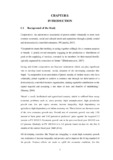Please use this identifier to cite or link to this item:
https://elibrary.tucl.edu.np/handle/123456789/2363| Title: | Socio-economic Contribution of Cooperatives: A Case Study of Niswartha Saving and Credit Cooperative, Mahalaxmi Municipality Lalitpur District Nepal |
| Authors: | Subedi, Pratima |
| Keywords: | socio-ecomomic contribution;savings;Financing |
| Issue Date: | Jan-2018 |
| Publisher: | Facutly of Rura Development |
| Abstract: | This thesis deals with the research work on the socio-ecomomic contribution of Saving and Credit Cooperative movement in Nepal under the heading “A case study of NSCCL, Imadol, at Mahalaxmi Municipality, Lalitpur. There are nearly one thousand members of which two hundred are local residents. NSCCL was established in 2067 B.S. This cooperative has earned very good reputation in the market for its contribution in socio-economic sector of the society. The daily transaction of this cooperative is nearly 10 million. This cooperative has issued 1,272,500 shares in the market @ NRs 100/share as shown in the annual report of 2072/073 B.S. The daily savings are shown as NRs 1,984,810.00 and monthly savings as NRs 6,659,904.00. In total NSCCL has total of 8,644,714 saving amounts. The main objectives of this cooperative is to support its shareholders in being self-dependent by providing an opportunity for selfemployment and thus to reduce unemployment, by creating their own business for living and as a whole, for community development and empowerment. Here, some essential ground works has been done for improving the working efficiency of NSCCL. It is a member of district cooperative. There are 335 shareholders of whom 156 are women and 179 men. For running daily operation efficiently, there are five (5) operation committee members, three (3) advisors, three (3) finance committee members and three (3) loan committee members. There are seven (7) employees and one supervisor. There is also remittance facility. Every year this Cooperative runs socio-economic program to honor elderly members of above 65 years of age, to provide some financial support and foods for pregnant women during delivery, and sometimes it organizes blood donation program for the benefit of the society. Questionnaires were used for carrying out survey and data collection in the research. One day discussion was held with the Focus Group in cooperative office hall. Twelve (12) people participated in the discussion on contribution of cooperative, efficient and smooth operation of NSCCL, on the plans and programs for improving socio-economic condition of its members and are these programs being run successfully. Another one day meeting was held as Key Information Interview among committee members. There were six (6) members participating in this meeting. During this research survey was made in every member’s house to collect required information. Some members were friendly to answer to the questions but other members were less cooperative in the research. Cooperation is a traditional culture in Nepal. Different formal and informal institutions are in operation since centuries. Government of Nepal first registered “Bakhan” multipurpose cooperative in 2013 BS (1956 AD) nearly 61-62 years ago. It was then established to support 8 rehabilitation of the flood victim. Then after; cooperatives passed through different stages and situation. According to NSCCL, this cooperative was established in 2067 B.S. There were nearly 30 founding members. There after the membership of NSCCL increased slowly. In the beginning cooperative was functioning only as saving and providing loan for its members. Until 2072 BS NSCCL didn't had any office accommodation. With the increase of the membership the committee members realized that there should be an office accommodation for cooperatives to work smoothly and manage it efficiently. After office was opened, NSCCL has been functioning in a more effective way Cooperative works include daily savings, credit loans, bonus program to its employees, encouragement and awareness work, health related work, socio-economic empowerment work, education related work etc. The cooperative has been engaged in many sectors to develop society. In survey it was found that the members have been able to improve their life style after joining NSCCL. They have been able to establish their own business. It has helped to reducing poverty in the society. Here, members are participating in social work like cleaning program, blood donation program, road maintenance and cleaning, improve electricity supply to houses or reducing street lights problem. During the study it was found that, NSCCL is mainly focusing in collecting money, giving loan to the members and distributing profit yearly to its shareholder members. This cooperative is targeting in local residents to become its member. It is operating some scheme to benefit its members. There are women scheme, student scheme, elder citizen scheme etc. Using a combination of interview, focus group discussion and questionnaire techniques, the study covers the activities of cooperative society located in communities. This could be of benefit to rural finance providers and the cooperative members. Finally the contribution of NSCCL to its members is positive. Cooperative plays vital role to provide financial service to its members and help to generate the economic activities in the society. Transformation of unproductive money to the productive sector is very crucial role played by cooperative. Cooperative creates the environment of cooperation among its members. They work together to achieve mutual objective. This helps to appropriately identify the roles of cooperative societies in rural finance to help increase in household income, ownership of household assets and acquisition of enterprise assets. |
| URI: | http://elibrary.tucl.edu.np/handle/123456789/2363 |
| Appears in Collections: | Rural Development |
Files in This Item:
| File | Description | Size | Format | |
|---|---|---|---|---|
| cover (1).pdf | 556.46 kB | Adobe PDF |  View/Open | |
| CHAPTER.pdf | 1.42 MB | Adobe PDF |  View/Open |
Items in DSpace are protected by copyright, with all rights reserved, unless otherwise indicated.
